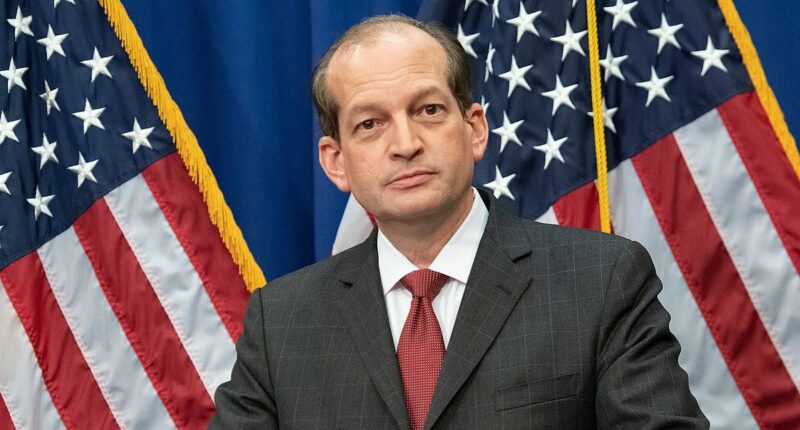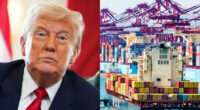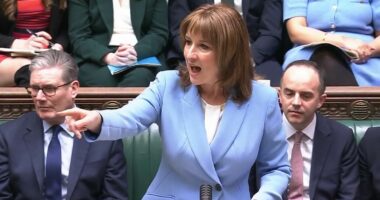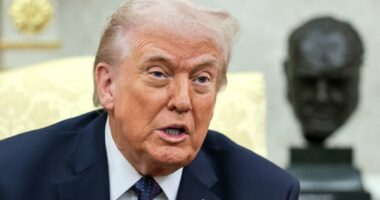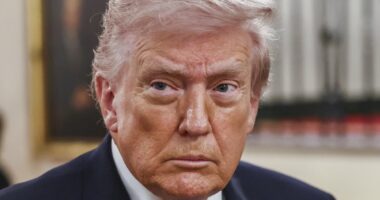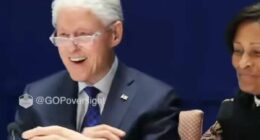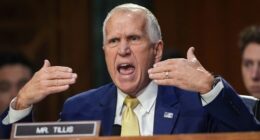Share this @internewscast.com
Seventeen years ago, Alex Acosta made the decision to approve a deal with Jeffrey Epstein, which has resurfaced as a controversial topic due to its leniency. This agreement allowed Epstein to escape a potential life sentence.
Acosta, who once served as a US attorney in Florida, is now required to face questions regarding this 2008 arrangement with Epstein.
During Trump’s administration, Acosta also held the position of Labor Secretary, but the scandal halted his rising political career. He is set to testify before the House Oversight Committee on September 19, as part of a renewed inquiry into Epstein’s extensive list of offenses.
After mounting pressure from Democrats to subpoena Acosta, the 56-year-old has agreed to voluntarily appear before the panel.
He will be grilled about a sweetheart deal his office struck with Epstein amid an investigation into reports he was sex trafficking minors.
The undisclosed agreement prevented federal charges by having Epstein plead guilty to state charges involving a lone minor.
As a result, Epstein served only 13 months in a Palm Beach County jail. However, he benefited from a work-release program, allowing him to leave jail regularly, accompanied by a private security team.

The former US attorney for the Southern District of Florida is now compelled to address the decisions made in the controversial 2008 deal with Epstein.

He will be grilled about a sweetheart deal his office struck with Epstein amid an investigation into reports he was sex trafficking minors
If the deal had not been pushed through by Acosta’s team, Epstein faced life behind bars under federal charges.
The deal would go on to haunt Acosta for the remainder of his career.
It was ruled as illegal and in violation of the Crime Victims Rights Act for failing to consult with the victims.
It was brought up again at his confirmation hearing in 2017 by several critics who questioned whether Acosta would prioritize powerful interests over victims in his new role.
Then in 2019, he was forced to step down as Labor Secretary as details of the plea deal emerged when Epstein was arrested once again, this time on federal sex trafficking charges.
Acosta was put under mounting pressure to answer new questions about the deal, and why he hid it from Epstein’s victims and their families.
At the time, a Justice Department Office of Professional Responsibility investigation determined Acosta ‘made the pivotal decision to resolve the federal investigation of Epstein through a state-based plea.’

Acosta, who served as Labor Secretary in Trump’s first administration and was a rising star before the scandal cut his career short, will appear before the House Oversight Committee on September 19 as part of a renewed investigation into Epstein’s laundry list of crimes

Epstein’s co-conspirator Ghislaine Maxwell, who is serving a 20-year sentence for her role in Epstein’s sick crimes, has long argued the deal Acosta made – which gave immunity to four co-conspirators – should cover her
‘[He] either developed or approved the terms of the initial offer to the defense that set the beginning point for the subsequent negotiations that led’ to the non-prosecution agreement,’ the investigation found.
It was also determined that Acosta’s office skirted around the FBI and the victims of the case by making the plea deal for the state charges.
The office said its investigation had turned up no evidence that Acosta was swayed by ‘impermissible considerations, such as Epstein’s wealth, status, or associations’ and in fact had resisted efforts by defense lawyers to return the case to the state for whatever outcome the state wanted.
After Acosta’s 2019 resignation, he did not return to politics, but the ramifications of the deal are still being felt today.
Epstein’s co-conspirator Ghislaine Maxwell, who is serving a 20-year sentence for her role in Epstein’s sick crimes, has long argued the deal Acosta made – which gave immunity to four co-conspirators – should cover her.
Prosecutors found a loophole in which they were able to target Maxwell in New York, which treats such agreements differently to the vast majority of American states.
The Epstein saga returned to the headlines in July after Attorney General Pam Bondi sensationally announced there was no ‘client list’ after months of peddling theories about the sought-after document.

The Epstein saga returned to the headlines in July after Attorney General Pam Bondi sensationally announced there was no ‘client list’ after months of peddling theories about the sought-after document
Back in February, Bondi said the client list was ‘on her desk’ waiting to be reviewed. At the time, she told journalists the FBI was reviewing ‘tens of thousands of videos’ of Epstein ‘with children, or child porn.’
The Wall Street Journal then published shock allegations that Trump had participated in a book for Epstein’s birthday which featured a ‘lewd’ drawing and message.
Trump denied the allegations and launched legal proceedings against the publication.
The House Oversight Committee in July voted 8-2 to subpoena the Department of Justice for all files related to the Epstein investigation amid the widespread backlash over Bondi’s handling of the matter.
The committee also subpoenaed the Epstein estate for access to the birthday book and all of the letters written to accompany the book.
Former President Bill Clinton, former Secretary of State Hillary Clinton and several former Justice Department top officials were subpoenaed by name, including Acosta’s boss during his time in Florida, Alberto Gonzales.
But Democrats were outraged that Acosta himself was left off the initial list.
‘How can any genuine investigation into the federal government’s sweetheart deal with Epstein (including the extraordinary grant of blanket immunity to all his named and unnamed co-conspirators) omit Alex Acosta?’ Epstein victim attorney Jack Scarola told NBC.
